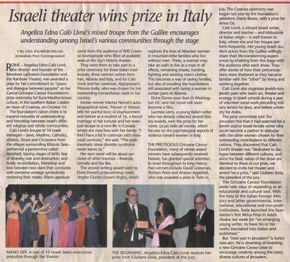| |


Israeli theater wins prize in Italy
|
THE
JERUSALEM POST
Middle East & Israel Breaking News » Arts & Culture » Arts » Article
|
Oct 26, 2008 |
By LISA PALMIERI-BILLIG
Angelica Edna Calò Livnè, the director and founder of the Beresheet
LaShalom Foundation and the Rainbow Theatre, was awarded a prize for her
commitment to "peace and dialogue between peoples" at the Carical
Grinzane Cavour Foundation's prize ceremony for Euro-Mediterranean
culture, in the southern Italian Calabrian town of Cosenza, on October
14.
 The foundation's raison d'etre is to expand networks of understanding
and friendship between Israel's different religious and ethnic
communities. The foundation's raison d'etre is to expand networks of understanding
and friendship between Israel's different religious and ethnic
communities.
Calò Livnè's troupe of 10 Israeli teenagers - Jews, Muslims, Catholics,
atheists, Druse and Circassians from the villages surrounding Kibbutz
Sasa - performed a pantomime called Beresheet, tracing stages of birth,
fear of diversity, war and destruction, and finally reconciliation,
friendship and love between two clans that concludes with everyone
onstage symbolically removing their masks. Warm applause came from the
audience of 800 Cosenza townspeople who filled all available seats at
the city's historic theater.
They were there to take part in a prize ceremony for three Italian
intellectuals, three women writers from Iran, Albania and Italy, and for
Calò Livnè and her cowinner, Afghanistan's Princess India, who was
chosen for her outstanding humanitarian work in her country.
Iranian winner Marina Nemat's autobiographical novel, Prisoner of
Teheran, tells her painful story of imprisonment and torture as a
student of 16, a forced marriage to her torturer and her eventual escape
to a new life in Canada where she now lives with her family. "I feel I
have a lot in common with Holocaust survivors," she said. "The
post-traumatic stress disorder syndrome never leaves us."
Her next novel will be about survivors of other traumas - Rwanda,
Somalia and the like.
The second writing award went to Elvira Dones's prize-winning novel,
Vergine Giurata (Sworn Virgin), which explores the lives of Albanian
women in mountain-tribe families who live without men. There, a woman
may take an oath to live as a man in all effects, remaining chaste,
hunting, fighting and wearing men's clothes. This becomes a way of
saving families, but also of avoiding the humiliations still associated
with being a woman in certain parts of Albania.
Elvira Dones now lives in Washington DC and her novel will soon become a
film.
Lucrezia Lerro, a young Italian writer who has already collected several
literary awards, won the prize for her novel, La più bella del mondo,
which focuses on the psychological aspects of violence toward women in
Italy.
THE PRESTIGIOUS Grinzane Cavour Foundation, many of whose award winners
have subsequently received Nobels, has granted special attention to
Israel throughout its long history. Past winners include David Grossman,
Shimon Peres and Aharon Appelfeld, who was awarded a prize in Turin in
July. The Cosenza ceremony was begun last year by the foundation's
president, Mario Bozzo, with a prize for Amos Oz.
Calò Livnè, a vibrant Israeli writer, director and teacher - and
kibbutznik of Italian origin - is well known in Italy, where she and her
troupe perform frequently. Her young Israeli student actors from the
Galilee willingly share their life-transforming experiences by chatting
from the stage with the audience after each show. They offer stories of
how their preconceptions were shattered as they became familiar with the
"other" by living and working together.
Calò Livnè also organizes Jewish-non-Jewish pairs who teach art, theater
and ecology in Israeli schools during a year of volunteer social work
preceding military service for Jews, and before university for Arabs.
The prize committee told The Jerusalem Post that it had searched for a
Jewish and/or Israeli female writer who could become a partner in
dialogue with the other women chosen for their outstanding contributions
to different nations. They discovered that Calò Livnè's theater was
"dedicated to dialogue between different cultures, and since the basic
values of her show are identical to those of our prize, we decided to
invite her theater and award her a prize," said Giuliano Soria, the
president of the jury.
The Grinzane Cavour Foundation seeks new ways of expanding as an
educational and cultural tool. With the help of the Italian Foreign
Ministry and other governmental, international, educational and
non-profit institutions, Soria launched the foundation's first Africa
Prize in Addis Ababa last week for "an emerging young writer, to have
his or her works translated into Italian and published."
But "next year in Jerusalem" is Soria's new aim. He is dreaming of
inventing a new Grinzane Cavour prize to encourage creativity among the
many diverse cultures of Jerusalem.
|

|
|



